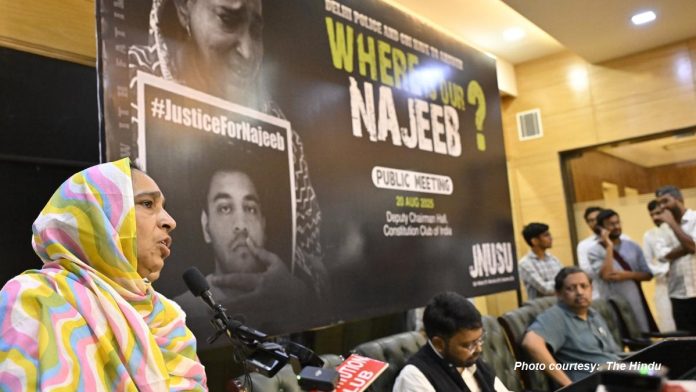New Delhi: The mother of missing Jawaharlal Nehru University (JNU) student Najeeb Ahmad has vowed to continue her struggle for justice after a Delhi court closed the long-running case. Najeeb, a 27-year-old MSc student, disappeared from his hostel room in October 2016 following an alleged altercation with members of the Akhil Bharatiya Vidyarthi Parishad (ABVP). Despite multiple investigations by Delhi Police, the Crime Branch, and later the Central Bureau of Investigation (CBI), his whereabouts remain unknown.
The Patiala House Court discharged nine students who were accused in connection with the case, ruling that there was no sufficient evidence against them. The CBI, which had taken over the probe in 2017, had earlier filed a closure report stating that it found no clue regarding Najeeb’s disappearance. The court accepted the agency’s findings, which came as a major disappointment for Najeeb’s family.
Speaking to reporters after the verdict, Najeeb’s mother Fatima Nafees said she would not stop demanding justice for her son. “As long as I live, I will speak out for Najeeb,” she said. Fatima has been at the forefront of protests and public appeals since her son went missing, becoming a prominent voice against what she describes as institutional failure and apathy. She accused investigative agencies of shielding those responsible and expressed frustration over the lack of accountability.
Rights groups, student organizations, and activists have also expressed concern over the closure of the case. They argue that the manner in which the investigation was conducted reflects a broader trend of weakening institutional responses to crimes involving marginalized communities. Several groups have reiterated their demand for an independent and time-bound inquiry to establish the truth.
The JNU campus had witnessed massive protests in the immediate aftermath of Najeeb’s disappearance, with students demanding a fair probe and greater campus security. The incident sparked nationwide debates on student safety, campus politics, and the role of state institutions in addressing grievances. Nearly nine years later, the case continues to be a reminder of unanswered questions and unresolved pain for the family.
For Fatima Nafees, the fight remains personal. She has stated her determination to explore every available legal and public platform to seek justice. Her persistence has kept the issue alive in public discourse, ensuring that the disappearance of her son is not forgotten.




